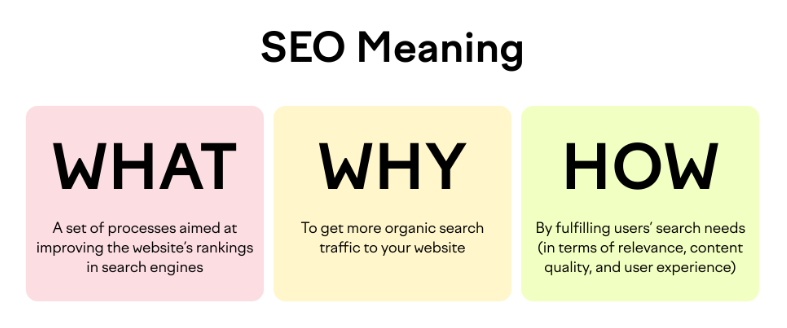Search Engine Optimization
What is Search Engine Optimization?
Definition:
Search Engine Optimization (SEO) automation involves the use of technology, algorithms, and artificial intelligence to streamline and optimize various aspects of a website’s online presence with the goal of improving its visibility on search engine results pages (SERPs). This comprehensive approach encompasses activities such as keyword research, on-page optimization, content creation, link building, and performance analysis.
Analogy:
Think of SEO automation as a sophisticated digital marketing assistant. Similar to how an assistant would strategically manage various marketing tasks, SEO automation tools take charge of routine optimization activities, allowing digital marketers to focus on strategy, creativity, and adapting to evolving search engine algorithms.
Further Description:
SEO automation integrates advanced technology into different facets of the optimization process, including:
Keyword Research: Automated tools analyze search trends, competition, and user behavior to identify relevant keywords, helping marketers target the right audience.
On-Page Optimization: Automation ensures that web pages are structured and tagged correctly, optimizing meta tags, headers, and content for search engines.
Content Creation: AI-driven content generation tools assist in creating relevant, engaging, and optimized content that aligns with both user intent and search engine algorithms.
Link Building: Automation aids in identifying potential link opportunities, managing outreach, and monitoring backlink profiles to enhance a website’s authority.
Performance Analysis: Automated analytics tools provide insights into website traffic, user behavior, and keyword performance, aiding in data-driven decision-making.
Why is SEO Automation Important?
Efficiency and Accuracy: Automation speeds up SEO tasks, reducing the time spent on manual efforts and ensuring a higher level of precision in optimization activities.
Adaptability to Algorithm Changes: SEO automation tools can quickly adapt to changes in search engine algorithms, ensuring that websites stay compliant and maintain optimal visibility.
Data-Driven Strategy: Automated analytics provide valuable data, enabling marketers to track the success of their SEO efforts, identify areas for improvement, and refine their strategies.
Competitive Edge: Automation allows businesses to stay ahead of the competition by continuously optimizing their online presence and adapting to industry trends.
Examples and Usage:
Keyword Research Tools: Automated platforms analyze search data, competition, and user behavior to provide valuable insights for effective keyword targeting.
Content Optimization Tools: AI-driven tools assist in creating and optimizing content for search engines, ensuring relevance and quality.
Backlink Management Platforms: Automation aids in identifying link-building opportunities, managing outreach, and monitoring the health of a website’s backlink profile.
SEO Auditing Software: Automated tools analyze websites for SEO best practices, identifying issues and suggesting improvements to enhance overall performance.
Key Takeaways:
- SEO automation utilizes technology to optimize various aspects of a website’s online presence.
- Activities covered include keyword research, on-page optimization, content creation, link building, and performance analysis.
- Benefits include increased efficiency, adaptability to algorithm changes, data-driven decision-making, and gaining a competitive edge.
- Examples of SEO automation tools include keyword research platforms, content optimization tools, backlink management platforms, and SEO auditing software.





